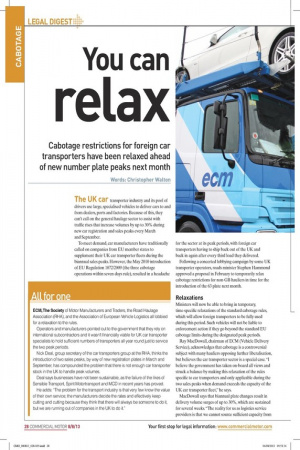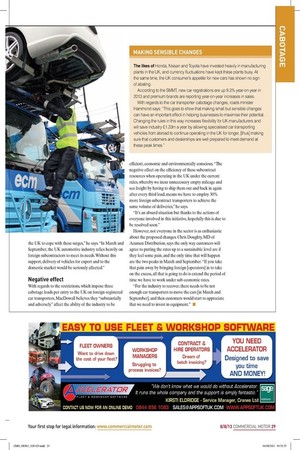You can
Page 23

Page 24

If you've noticed an error in this article please click here to report it so we can fix it.
relax,
Cabotage restrictions for foreign car transporters have been relaxed ahead of new number plate peaks next month Words: Christopher Walton
The UK car transporter industry and its pool of drivers use large, specialised vehicles to deliver cars to and from dealers, ports and factories. Because of this, they can't call on the general haulage sector to assist with traffic rises that increase volumes by up to 30% during new car registration and sales peaks every March and September. To meet demand, car manufacturers have traditionally called on companies from EU member states to supplement their UK car transporter fleets during the biannual sales peaks. However, the May 2010 introduction of EU Regulation 1072/2009 (the three cabotage operations within seven days rule), resulted in a headache
for the sector at its peak periods, with foreign car transporters having to ship back out of the UK and back in again after every third load they delivered.
Following a concerted lobbying campaign by some UK transporter operators, roads minister Stephen Hammond approved a proposal in February to temporarily relax cabotage restrictions for non-GB hauliers in time for the introduction of the 63 plate next month.
Relaxations
Ministers will now be able to bring in temporary, time-specific relaxations of the standard cabotage rules, which will allow foreign transporters to be fully used during this period. Such vehicles will not be liable to enforcement action if they go beyond the standard EU cabotage limits during the designated peak periods.
Ray MacDowall, chairman of ECM (Vehicle Delivery Service), acknowledges that cabotage is a controversial subject with many hauliers opposing further liberalisation, but believes the car transporter sector is a special case. "I believe the government has taken on-board all views and struck a balance by making this relaxation of the rules specific to car transporters and only applicable during the two sales peaks when demand exceeds the capacity of the UK car transporter fleet," he says. MacDowall says that biannual plate changes result in delivery volume surges of up to 30%, which are sustained for several weeks. "The reality for us as logistics service providers is that we cannot source sufficient capacity from
the UK to cope with these surges," he says. "In March and September, the UK automotive industry relies heavily on foreign subcontractors to meet its needs. Without this support, delivery of vehicles for export and to the domestic market would be seriously affected."
Negative effect
With regards to the restrictions, which impose three cabotage loads per entry to the UK on foreign-registered car transporters, MacDowall believes they "substantially and adversely" affect the ability of the industry to be
With regards to the restrictions, which impose three cabotage loads per entry to the UK on foreign-registered car transporters, MacDowall believes they "substantially and adversely" affect the ability of the industry to be
efficient, economic and environmentally conscious. "The negative effect on the efficiency of these subcontract resources when operating in the UK under the current rules, whereby we incur unnecessary empty mileage and sea freight by having to ship them out and back in again after every third load, means we have to employ 30% more foreign subcontract transporters to achieve the same volume of deliveries," he says.
"It's an absurd situation but thanks to the actions of everyone involved in this initiative, hopefully this is due to be resolved soon."
However, not everyone in the sector is as enthusiastic about the proposed changes. Chris Doughty, MD of Acumen Distribution, says the only way customers will agree to putting the rates up to a sustainable level are if they feel some pain, and the only time that will happen are the two peaks in March and September. "If you take that pain away by bringing foreign [operators] in to take on the excess, all that is going to do is extend the period of time we have to work under sub-economic rates. "For the industry to recover, there needs to be not enough car transporters to move the cars [in March and September], and then customers would start to appreciate that we need to invest in equipment." •









































